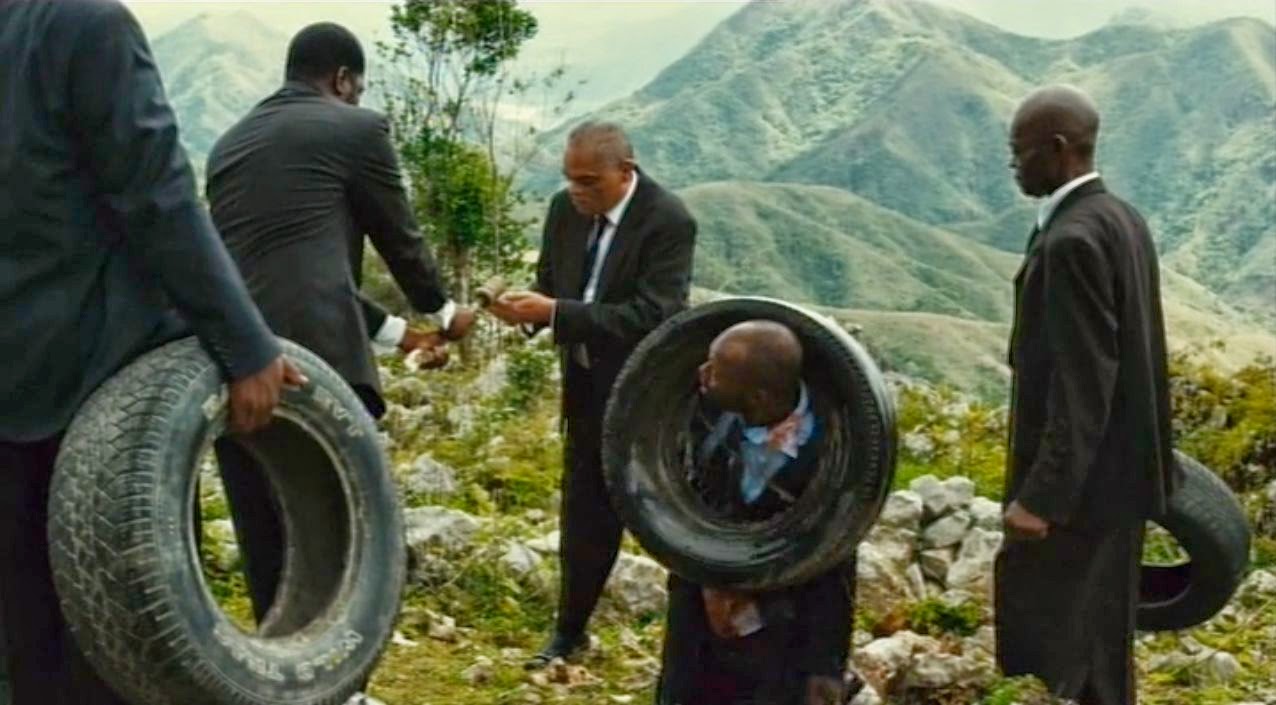So it was ironic that this fictional justification for the most bloody and illegal overthrow of a popular elected government in recent Latin American history was the “
centerpiece” of this year’s Human Rights Watch International Film Festival in New York. Rather than analyzing and condemning Washington’s relentless destabilization of Haiti’s nascent and imperfect democracy, a campaign minutely dissected in Peter Hallward’s “
Damming the Flood” (Verso, 2007), “
Peck delivers a searing critique of a government corrupted by power and an individual driven mad by it,” trumpets Human Rights Watch.
The film, a variation on Aleksandr Sokurov’s film “
Moloch” about Adolph Hitler, portrays the final day of unraveling of the regime and sanity of President Jean de Dieu (played by French actor Zinedine Soualem), a former priest from the slums known as “Ti Jean,” who sprinkles foreign languages in his speeches and is married to a Haitian-American lawyer (played by former French beauty-queen Sonia Rolland). Anyone even vaguely familiar with Haiti’s recent history sees that these characters represent Aristide, also known as “Titid,” and his wife Mildred Trouillot Aristide.
But Peck tries to obscure this parallel, doing what a Haitian proverb calls “
voye roch kache men” (throw a rock then hide your hand). In interviews, he claims that Jean de Dieu is a composite of foreign and Haitian leaders and that the film a meditation on the corrupting influence of power in general. At the New York showing, as at other festivals, Peck cited Silvio Berlusconi, Vladimir Putin, Richard Nixon, George Bush, Jean-Claude Duvalier, and René Préval as his references. Hogwash. The film is 99% about Aristide and Peck’s problems with him.
THE TURGID “
MOLOCH TROPICAL” SADLY DEMEANS THE OVERALL BODY OF PECK’S WORK
And what are those problems? Peck feels “
betrayed” by Aristide, he said in remarks after the New York showing, whom he, like almost every other progressive Haitian intellectual, supported in the late 1980s and early 1990s when the priest emerged as the leader of the post-Duvalier democracy movement. Between the first Washington-backed coup d’état against him on Sep. 30, 1991 and the second on Feb. 29, 2004, Aristide made a number of political concessions, compromises, maneuvers, head feints, and what he called “
jwèt entelijans” (games of intelligence) in an effort to outwit and wrestle with Washington’s “
laboratory,” as Aristide calls the CIA-Pentagon nexus that undid him twice. Over the years, these compromises alienated many of Aristide’s former allies, who almost always speak of “
betrayal.” Often, they are angry because Aristide did not name them to a government post or return their phone calls.
But for most Haitian leftists, Aristide’s cardinal sin was his agreement with President Bill Clinton to return to Haiti in 1994 on the shoulders of 20,000 U.S. troops, thereby facilitating the second foreign military occupation of Haiti in the 20th century after that of 1915 to 1934. (The “deal” quickly soured when Aristide reneged on plans to privatize Haiti’s state enterprises and slash state payrolls, which led the Clinton White House to push him out of office in February 1996 rather than allow him to recoup the three years he had spent in exile, as large segments of the Haitian people demanded.)
One might have thought that this violation of national sovereignty was the “
betrayal” that Peck opposed on principle, but no. Peck agreed to become President Préval’s Culture Minister in 1997 under the continuing military occupation (then administered by the UN), which suggests his anti-occupation convictions were not all that strong.
Even more incoherent is Peck’s premise, stated after the film, that “
Washington and Paris supported Aristide and pushed the opposition to make a deal with him up until three days before he left.” (By the way, Peck does not accept Aristide’s assertion that he was kidnapped by U.S. soldiers.) Throughout the film, Jean de Dieu’s wife warns him “
Washington is going to drop you,” as if U.S. officials had been backing him until then. Reality is just the opposite. Washington did everything it could to thwart Aristide’s re-election in 2000 and began a diplomatic, economic, political and paramilitary “contra” campaign to unseat him even before he was sworn in on Feb. 7, 2001.
So, it is again ironic that the director exhumes every element of the 1991-94 and 2004-06 coup propaganda campaigns hatched in Washington and the Haitian bourgeoisie’s salons. Peck delights in garishly recreating all the discredited caricatures: “Aristide the demagogue,” “Aristide the mentally unbalanced,” “Aristide the mob mobilizer,” “Aristide the necklacer,” “Aristide the womanizer,” “Aristide the megalomaniac” etc. ad nauseam.
One of Peck’s first and frequently revisited targets in this ponderous film is Aristide’s 2003 demand that France repay Haiti some $21 billion for the “independence debt” of 90 million gold francs that Paris extorted from its former colony from 1824 to 1947. Perhaps Peck’s dogged ridiculing of this perfectly reasonable, legally sound, and widely hailed official call for reparations (the first by any former colony) has something to do with his recent appointment to head the French government’s prestigious film school,
La Fémis?
We see Mother Theresa, a thinly-veiled version of Lavalas activist Annette “So An” Auguste, muster and give a pep talk to a crowd of lumpen thugs called
chimères (chimera) to cries of “
Koupe tèt, boule kay” (Cut of heads, burn houses!) before they go to bust up an opposition demonstration. These scenes imply that Aristide rallied artificial mobs to counter legitimate street protest. The opposite is true. Haiti’s poor, just as in Venezuela two years earlier, usually spontaneously organized to counter the coup d’état’s spearhead, the National Endowment for Democracy-spawned “civil society” front called the “Group of 184″, which was financed, coached and protected by the French and U.S. embassies.
We see a preening, oblivious African-American actor arrive and play the role of Toussaint L’Ouverture in a Palace play to honor Haiti’s independence anniversary, an obvious dig at Hollywood actor and Aristide defender Danny Glover, who performed in Haiti for the 2004 bicentennial.
A scene where President Jean de Dieu has one of his critics, a former friend, burned alive.
The U.S. and France-led boycott of those bicentennial celebrations was one of the saddest chapters of recent Haitian history. The only head of state to attend was South African President Thabo Mbeki. Peck makes fun of the difficulties Aristide faced as the noose tightened around him. A tough Jean de Dieu aide at one point barks at her assistant: “
Get me whites! I need whites!” She is often seen complaining by cell phone to various U.S. officials about their diplomatic snub.
Jean de Dieu’s oppressed, captive, and unhappy wife just wants to escape to the U.S. with their daughter. The president treats her very badly, brushing aside advice and even an attempted caress. But here, as at other points, the film is inconsistent because it starts with a scene of the president longingly stroking the naked back of his sleeping wife, who is startled awake only to rebuff him.
The Aristide analogue is also a lascivious jerk who forces a reluctant maid to perform sexual favors for him. In fact, the president’s unbridled sexual appetite – he makes lewd remarks to the ersatz Glover’s female co-star on her arrival at the Palace – is one of the film’s main themes, lending it a moralizing air.
Later Jean de Dieu forgets to take his medication and begins to act aberrantly. In front of his wife and a room of dignitaries at a public state dinner, he starts to fondle and dance with the maid, prompting her boyfriend, a saxophone player, to leap off the stage where he is performing, only to be shot dead.
Then our Aristide stand-in runs around naked under the moon in the bush surrounding the Citadel, the mountain-top fortress built by Henri Christophe to repel a French invasion, where the parody is entirely set.
(CIA analyst Brian Latell, in concert with conservative North Carolina Senator Jesse Helms, started the later disproved rumor in October 1993 that Aristide was on psychiatric medication and had been treated for mental illness in a Canadian hospital as part of a disinformation campaign aimed at scuttling Aristide’s first projected return to Haiti on Oct. 30, 1993. It is shocking to see Peck resuscitate such calumnies.)
One hapless journalist (Jimmy Jean-Louis), a former friend of the president who wrote an unflattering editorial, is horribly tortured, then gussied up by a makeup artist to be brought to a private candlelight dinner with the president. But the tortured journalist refuses to budge from his principles and denounces the president to his face.
“
You are not a monster,” the barely conscious journalist, his face scarred and swollen from torture, tells Jean de Dieu, as Peck would speak to Aristide. “
A monster has some majesty. You gave the people hope. You soiled their dream. You wanted to be a prophet. You weren’t even a consistent monster. I would pity you, but I don’t know how.”
The president has his henchmen take the journalist outside and burn him alive with a tire around his neck, From atop the Citadel, Jean de Dieu looks down on the scene, lamenting: “
My friend! My brother!”
This gives an idea of the director’s light touch in this interminable work of cinematic slander and vengeance.
Peck produced the film himself for about $600,000 so “
I could say what I wanted and wouldn’t have to answer to anybody,
” he said after the showing. However, it might have been a good idea if someone had helped him apply some brakes to his antipathy towards Aristide.
“
I wanted to re-examine, with Shakespearian irony, the tragic and foolish nonsense of the past 40 years,”Peck said after the New York showing. I would argue that the past 40 years has not been “
nonsense” at all. On the contrary, the Haitian people have waged a fierce and difficult struggle to uproot one of the hemisphere’s most ruthless dictatorships and hoisted to international prominence a parish priest who, for the first time, in communion with the Haitian people, foiled U.S. election engineering.
Granted, Aristide made plenty of mistakes, everybody agrees on that, even his fiercest partisans. But he certainly does not merit the outrageous portrayal he receives in this film which ultimately blames the two-time victim of US “
regime change.”
In the end, the turgid “
Moloch Tropical” sadly demeans the overall body of Peck’s work, which includes great films like “
Lumumba” (2000) and “
Man by the Shore” (1993). The director is now working on a film about the young Karl Marx. One certainly hopes that the result would not induce from Marx, were he alive, the famous exasperated remark Engels reports he made about some of his admirers: “
All I know is that I am not a Marxist!”








